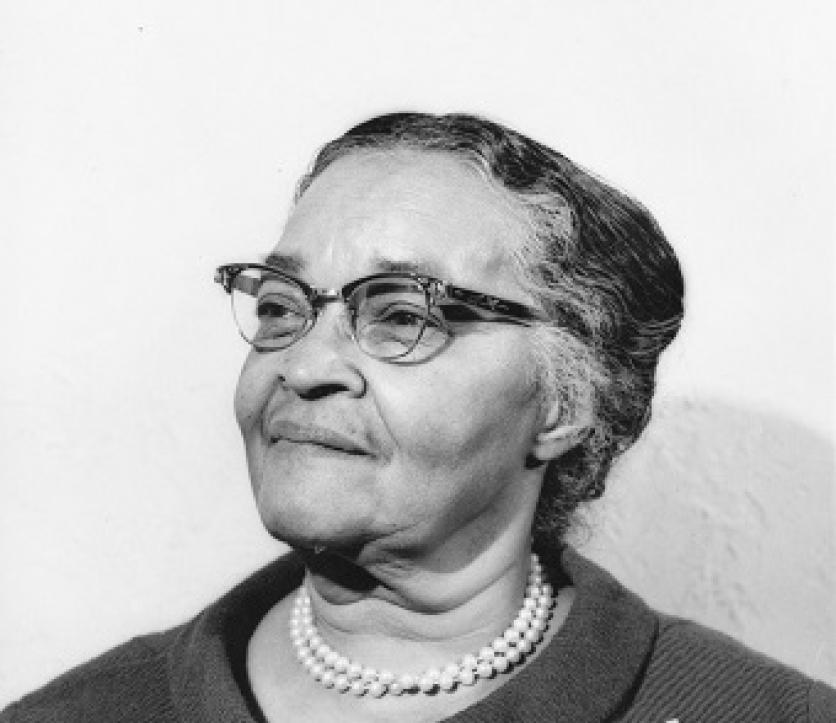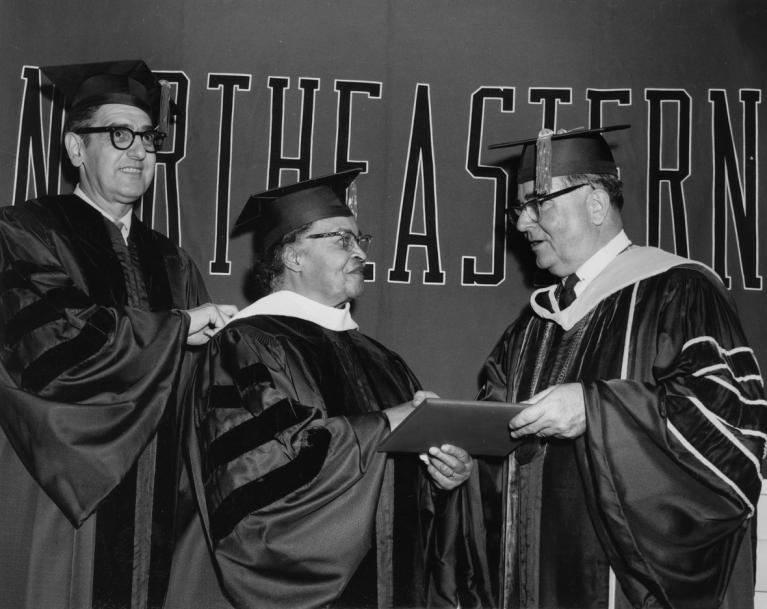Suffragist, Clubwoman, Community Leader and Advocate
by Katie Woods, Digital Public Historian
Belovedly called the “First Lady of Roxbury,” Melnea Agnes (Jones) Cass stood as a pillar in the Boston community. She dedicated decades of her life to public service and advocating for others.
Born in Virginia, a five year-old Melnea Agnes Jones came to Boston with her family. Melnea spent her youth in Boston and later Newburyport, Massachusetts and Rock Castle, Virginia following the death of her mother. Returning to Massachusetts after her high school graduation in Virginia in 1914, she worked for several years as a domestic worker in Cape Cod and Boston. She married Marshall Cass in 1918 and had three children.
Melnea Cass’s first foray into activism in Boston was through women’s suffrage. She learned about the suffrage movement from her mother-in-law, Rosa Brown, and became among the first women in her neighborhood to register to vote in 1920.
Brown also encouraged Cass’s involvement in community organizations and clubs. Cass credits her mother-in-law for having her join the NAACP early on. Years later, Cass presided over the local chapter of NAACP (1962-1964) during the early civil rights years. As president, she led sit-ins and protests against segregation in Boston’s schools.
Also in part due to Rosa Brown’s influence, Melnea Cass became active in various women’s clubs, such as the Massachusetts State Union of Women’s Clubs, the National Association of Colored Women’s Clubs, and the Women’s Service Club. Melnea Cass eventually held leadership positions in all of these organizations.
Cass is perhaps best remembered for her time serving as president of the Women’s Service Club from 1962-1978. This community organization in Boston’s South End provided a welcoming space for Black women, particularly students, southern migrants, and immigrants. Through Cass’s steady leadership, the Women’s Service Club created programs for training domestic workers, such as the Homemakers Training Program and In-Migrant Program. The Club also successfully advocated for state legislation to improve domestic worker protections and rights.
Throughout her decades of activism, Melnea Cass also held leadership roles in the United South End Settlements, Action for Boston Community Development (ABCD), Freedom House Inc., the Mayor’s Advisory Committee for Affairs of the Elderly, and many other organizations and committees.
Melnea Cass received several honorary degrees and awards for her service to the greater Boston community. Despite these accolades, she lived her life with the understanding that anyone could make a difference in their community, believing “If we cannot do great things, we can do small things in a great way."
Additional Resources
Banner Staff. “Women’s History: Who was Melnea A. Cass?” Bay State Banner. March 21, 2019.
“Defining Their Sphere: Dr. Melnea Cass.” Boston National Historical Park. Accessed October 2023.
Guglielmo, Jennifer and Mia Michael. “First Lady of Roxbury.” A History of Domestic Work and Worker Organizing. Accessed May 2023.
Hurd Smith, Bonnie. “Melnea A. Cass (1896-1978).” Boston Women’s Heritage Trail. Accessed October 2023.
Paiste, Rachel. “On 'Melnea Cass Day,' Remembering The Boston Civil Rights Activist And Her Legacy In Roxbury.” WBUR. May 22, 2018.
Bibliography
“A community salute for Mrs. Melnea A. Cass: Testimonial dinner.” Freedom House, Inc. records (M16), Box 26, Folder 828. Series 3: Programs. Sub-Series A: Social and Community Programs. Adult Programs. Melnea Cass testimonial, 1966. Northeastern University Archives and Special Collections.
“Black History Boston: Melnea Cass.” City of Boston. Last Modified November 1, 2022.
Melnea Agnes Cass Oral History. Black Women Oral History Project Interviews, 1976–1981. OH-31. Schlesinger Library on the History of Women in America. Schlesinger Library, Radcliffe Institute, Harvard University.
“Melnea Cass Obituary, 1978.” Freedom House, Inc. records (M16), Box 26, Folder 828. Series 3: Programs. Sub-Series A: Social and Community Programs. Adult Programs. Melnea Cass testimonial, 1966. Northeastern University Archives and Special Collections.
Michael, Mia. “‘A Home Away from Home’: The Women’s Service Club of Boston.” National Park Service. Last Modified January 8, 2023.
Michael, Mia. “Dr. Melnea Agnes Cass.” National Park Service. Last Modified January 16, 2023.

